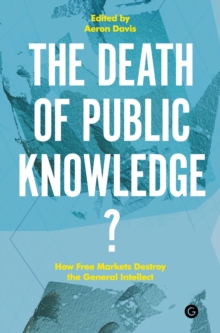
Can Markets Solve Problems? : An Empirical Inquiry into Neoliberalism in Action PDF
by Daniel Neyland, Vera Ehrenstein, Sveta Milyaeva
Part of the Goldsmiths Press / PERC Papers series
Description
A provocative analysis of market-based interventions into public problems and the consequences.
Market-based interventions have been used in attempts to solve numerous public problems, from education to healthcare and from climate change to privacy. Scholars have responded persuasively through critiques of neoliberalism. In Can Markets Solve Problems? Daniel Neyland, Vera Ehrenstein, and Sveta Milyaeva propose a different route forward.
There is no single entity knowable as "the market," the authors argue. Instead, they examine in detail the devices, relations, and practices that underpin these market-based interventions. Drawing on recent work in science and technology studies (STS), each chapter focuses on a different intervention and critically explores the market sensibility around which it is organized. Trade and exchange, competition, property and ownership, and investment and return all become the focus of a thorough exploration of what it means to intervene in public problems, how problems are composed, and how solutions are continually reworked.
Can Markets Solve Problems? offers the first book-length STS enquiry into markets and public problems. Weaving together rich empirical descriptions and conceptual discussions, the book provides in-depth insights into the workings of these markets, their continuous evolution, and the consequences. The result is a new avenue of critical inquiry that moves between the details of specific policies and the always-emerging, collective features of this landscape of intervention.
Information
-
Download - Immediately Available
- Format:PDF
- Pages:336 pages
- Publisher:Goldsmiths Press
- Publication Date:11/10/2019
- Category:
- ISBN:9781912685271
Information
-
Download - Immediately Available
- Format:PDF
- Pages:336 pages
- Publisher:Goldsmiths Press
- Publication Date:11/10/2019
- Category:
- ISBN:9781912685271










